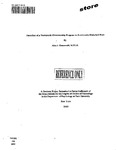THE EFFECT OF THERAPEUTIC HORSEMANSHIP PROGRAM ON EMOTIONALLY DISTURBED BOYS
| dc.contributor.author | GREENWALD, ALISA J. | |
| dc.contributor.other | Faculty of Health | en_US |
| dc.date.accessioned | 2013-09-11T11:38:01Z | |
| dc.date.available | 2013-09-11T11:38:01Z | |
| dc.date.issued | 2000 | |
| dc.identifier | NOT AVAILABLE | en_US |
| dc.identifier.uri | http://hdl.handle.net/10026.1/1661 | |
| dc.description.abstract |
The relationships between humans and animals have been associated with various therapeutic implications. While there is no agreed upon name, the term "pet facilitated therapy" has become widely accepted. Pet facilitated therapy has been particularly adopted to describe the relationship between humans and domestic animals. In contrast to public attitudes of twenty years ago, the field of animal-human relationships is now respected as a legitimate area of research investigation (Levinson, 1982.) Numerous studies have been conducted on the benefits of the relationships between domestic animals and humans; however, there continues to be little empirical evidence that specifically addresses the relationship between humans and horses. Therapeutic horseback riding, a term which takes into account the relationship formed with the horse both while riding and on the ground, has been widely accepted among the professionals in the field. Despite this agreement, applied research in the field is needed to validate its apparent benefits. The present study was developed to determine how a therapeutic horseback riding program can predict outcome on self-esteem, frustration tolerance, depression and anxiety. Participants were 81 emotionally disturbed males between the ages of 6-16 who were students in a residential treatment center. Results were analyzed using zero-order correlations and a series of setwise multiple regression equations. The results indicated that children who experienced a meaningful bond to a horse were more anxious and depressed. However, the bond with a horse did not significantly influence a child's self-esteem or frustration tolerance. Children who were more involved in the horsemanship program tended to be less depressed and anxious. A child's self-esteem and frustration tolerance were not affected by their involvement in the horsemanship program. Children's conduct in the horsemanship program did not significantly influence their self-esteem, frustration tolerance, depression or anxiety. Implications of these results are for the therapeutic use of horseback riding as an adjunct or alternative therapy for emotionally handicapped individuals. | |
| dc.language.iso | en | en_US |
| dc.publisher | University of Plymouth | en_US |
| dc.title | THE EFFECT OF THERAPEUTIC HORSEMANSHIP PROGRAM ON EMOTIONALLY DISTURBED BOYS | en_US |
| dc.type | Thesis | |
| plymouth.version | Full version | en_US |
| dc.identifier.doi | http://dx.doi.org/10.24382/4595 |
Files in this item
This item appears in the following Collection(s)
-
01 Research Theses Main Collection
Research Theses Main


